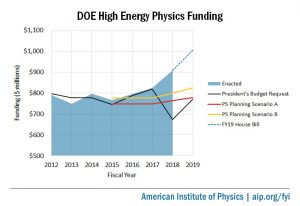
The U.S. has been without a “science adviser” (technically speaking, a Director of the Office of Science and Technology Policy, or OSTP) since the inauguration of the current president. Based on existing records, this is the longest that the U.S. has ever gone without this position being filled (492 days). I haven’t taken a broader look at the state of science policy in the U.S. in a long time, mostly because I have tried to remain entirely focused on research and teaching. Thinking about how this particular executive branch behaves also generally fills me with despair for our nation, so I guess I have also actively avoided it. But sometime, you just have to look into the wheelhouse to see if anyone is driving. Of course, you might learn you are on a big ship on an uncertain path, with no one steering.
UPDATE [June 10, 2018]: The New York Times has an excellent and very comprehensive article on how the Trump administration has almost entirely abandoned the use of science in policy, the use of scientists in science policy positions, and the filling of science policy advisory positions. They make an excellent point: negotiations with a nuclear-armed country demand scientific input (e.g. advice on whether or not de-nuclearization verification procedures are complete and sound), and there is no science advice used in the process of preparing for, or conducting, the upcoming summit with North Korea. Science, as a methodology, establishes the most reliable facts about reality; to abandon science in policy is, ultimately, to abandon reality in policy.
Climate Policy
Let’s begin with something that shouldn’t be controversial, but has been twisted into a political mess by people on every possible side of the issue: climate policy. Countless bodies have assessed the effect of human impact on the state of earth’s climate, and also the impact of those changes on humans, and the same conclusion keeps coming up again and again: humans have the power to change the climate, humans have already changed the climate, and the changing climate is already affecting our civilizations in various ways, most of them quite negative. This should have been seen as a moment to encourage new industries, and especially citizen activities, as well as trans-national action, to try to address the root causes, ameliorate the symptoms, or both. Instead, and especially in the current administration in the U.S., it is a moment to embed science denial directly into policy (what is said, and what is left unsaid), withdraw into the snail shell of nationalism and protectionism, and actively promote the activities and interests of the very agents whose activities contribute to the decline of our only home in the cosmos.
Witness the many actions of the now incorrectly named Environmental Protection Agency (EPA, under the leadership of the likely highly corrupt Scott Pruitt [1]. While his questionable behaviors as a member of the administration have drawn the scrutiny of corruption investigators, as well as the ire of many members of Congress, its high changes to U.S. environmental policy that deserve the most credit. His primary actions have been, wherever possible, to undo regulations put in place by the EPA to limit pollution of water, soil, whole communities, or other aspects of American air, water, and land [2]. Even if he is toppled from office by the breadth and depth of his official abuses, his legacy will leave a lasting scar on the nation all under the guise of promoting American business (which, while noble, is actually nowhere in the mission statement of the EPA[3]).
“Declaring war on any sector of our economy just doesn’t make sense at all. But that’s exactly what happened with the past administration,” Pruitt said in 2017 on a radio show. Pruitt doesn’t care that executing the duties of his office actually involves confronting the very agents who threaten the things his agency is designed to protect. Couching it as a war is clumsy rhetoric, a thin veil designed to appeal to the baser instincts of those listening while distracting them from the fact that he is in dereliction of the very duty of his office.
So, from the perspective of a national policy in implementing science-policy based climate or environmental decisions, the U.S. is in shambles. At best, the captain is steering us toward an iceberg. The question we have to answer is: will it melt before we hit it?
Science Policy Writ Large
As I mentioned at the beginning of this post, it has been almost 500 days since this president came into office and we are still without a person filling the role of Science Adviser to the President, the Director of OSTP. Not that I think this president would listen to advice from such a person, nor am I confident anyone nominated for that position would be qualified for the position (based on other nominations made by this administration). Since the president in incapable of telling the truth[4], it seems a huge waste of time to put a person in place who will simply be ignored for the rest of this term. Nonetheless, nothing speaks louder than the fact that the chief science adviser to the nation is a post left completely vacant, with no hint in public of movement to fill it.
In short, this administration could care less about science, despite the fact that it plays the leading role in our technological and economic advantages in the world. If the president actually had an “America First” strategy that was more than pandering to the basest nationalist sentiments of the president’s base, science and technology positions would have been the first to be filled.
The Science Budget – A Narrow Look
When it comes to planning for scientific projects, the chaos at the top makes it nearly impossible. Federal agencies have to plan based on what the president recommends in the annual budget proposal. For instance, in my own subfield, the president has consistently recommended significant cuts.

For FY18 [5], for example, the president requested a vast cut in the budget, from over $800M to about $690M. This would have spelled layoffs at national laboratories, the canceling of whole projects, and the cutting of already lean grants to U.S. research universities. Instead, Congress seems to have done what it’s been doing for many years: thanking the president for suggestions and then roundly ignoring them. After all, spending originates in the House and is the joint product of both halves of Congress. It is NOT the job of the president to make budget decisions; it is primarily the duty of the executive to enact them as directed by Congress. Never have scientists been so grateful for such governmental structures.
Congress not only ignored the president’s request, they enacts more spending than requested to address a variety of pressing scientific issues. This left federal agencies scrambling to spend the money; the decisions were only final in March, the fiscal year started last October, and all money must be spent by October 1 of this year. It’s the right problem to have, though it makes us all wish Congress could do its job on schedule, ahead of the start of an actual fiscal year.
While my own subfield has benefited from this chaos, to some degree, it could easily swing the other way, and I have no illusions about that. Every day of research is precious. There may not be such funding in the next cycle. You can see why I didn’t waste time blogging, though I do recognize that communicating these problems to a wider audience is essential to raising awareness about the problems so citizens can take action, if needed.
Summary
The U.S. is a nation of confusion right now. The best that scientists can do is to try to keep going, to plow through this mess. It’s not easy. I fear for my colleagues in climate science and environmental science; there is little support at the top of the national science policy establishment for the value of their work. Instead, information is sought from unscientific sources with clear political goals, institutions like the Heartland Institute (which once actively worked to discredit the science supporting the smoking and lung cancer link, and now brings the same anti-science hand to climate science) [6].
My subfield has benefited from the chaos, but one cannot count on this lasting long. Besides, given the focus on constraining the discretionary federal budget, it likely comes at a cost of some colleague’s equally valuable research. For now, what is most important to me is to focus on needs and targets, accomplish goals in the quest to better understand the cosmos, and live like there won’t be any funding tomorrow. This is, of course, no way to do science. Science requires long planning, steady funding, and a commitment through times of discovery famine to enable to periods of discovery feast. The executive branch is incapable of this right now, despite the best efforts of career staff whose work is undermined by a wily executive. Congress is doing a lot better on this, but with elections coming up it’s impossible to plan.
So the work goes on. While it can.
[1] https://www.washingtonpost.com/business/epa-inspector-general-to-probe-pruitts-use-of-security-detail-on-personal-trips/2018/04/19/c5a398b2-83d3-46f4-a5b2-cb39447f1008_story.html; https://www.washingtonpost.com/news/energy-environment/wp/2018/04/03/epas-pruitt-gave-big-raises-to-two-close-aides-after-being-rebuffed-by-the-white-house/; https://www.nytimes.com/2018/04/03/climate/pruitt-epa-apartment-emissions.html; https://www.wsj.com/articles/epa-chief-pruitt-faces-grilling-by-senate-panel-1526507962?mod=searchresults&page=1&pos=5
[2] https://www.nytimes.com/2018/04/03/climate/pruitt-epa-apartment-emissions.html
[3] https://www.epa.gov/aboutepa/our-mission-and-what-we-do
[4] http://www.politifact.com/personalities/donald-trump/
[5] https://www.aip.org/fyi/2018/doe-high-energy-physics-program-navigates-uncharted-budgetary-waters




